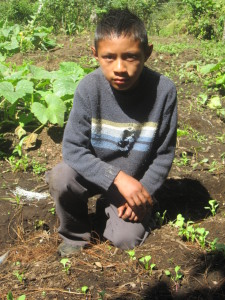The youth living in the Ixil region are well aware of the challenges facing their communities; and those that live in Chajul see and experience the effects of poverty, lack of educational opportunities, environmental degradation, and malnutrition every day. Fortunately, the students in our Philanthropiece Scholars program are developing the tools needed to tackle their community’s issues on their own. They are not only studying towards a university education, but also learning how to take their knowledge and apply it back to their own community. They are learning that the power to make change is inside of them.
In 2012, a group of Philanthropiece Scholars interested in the idea of food security collaborated with three elementary schools in the region to create school gardens. Maria Dominga, one of these Scholars, organized lesson plans that she shared with the students at the schools every week. The elementary students learned about the vitamins and nutrients vegetables contain, why they are important to eat and how to grow them. Now, these students are able to walk a visitor through the stages of plant development! With the help of a local agronomist, Marcelino, the students and their teachers participated in the creation of functioning gardens that yielded healthy, organic snacks throughout the year.
These gardens are not yet perfect and they certainly cannot solve the problems of malnutrition in Chajul by themselves, but they are a first step in the realization that solutions can be found within the community. Most importantly, they serve as a laboratory for Chajul’s youth to think critically about the issues they face. The Scholars are learning how to initiate projects, set goals, follow through and think critically when they hit roadblocks.
The Philanthropiece Scholars will continue designing and implementing their own social and economic initiatives as part of their professional development with Philanthropiece. By confronting real issues that affect their families and communities, these young men and women are learning how to apply the knowledge and experience they gain through formal education to the world around them. Every zesty radish pulled from the ground, along with every tear cried over a failed carrot crop, teaches them how to problem-solve and be the change they want to see in their own communities.



